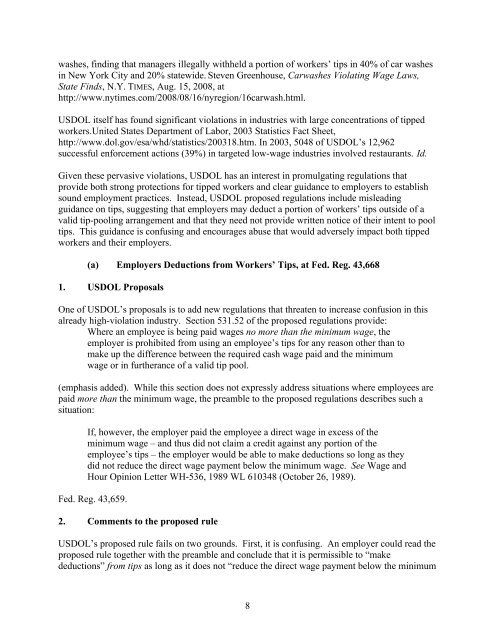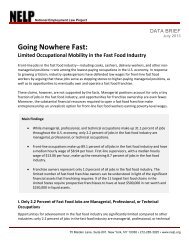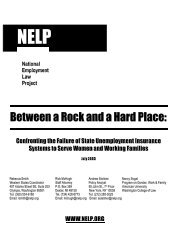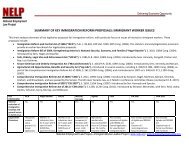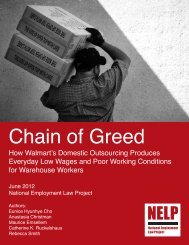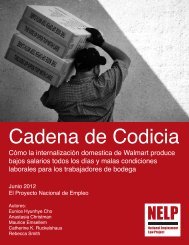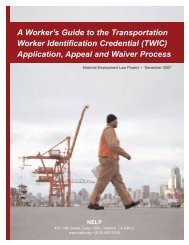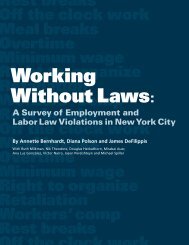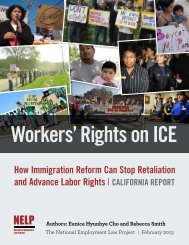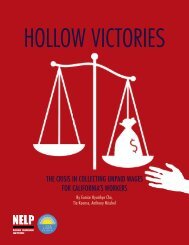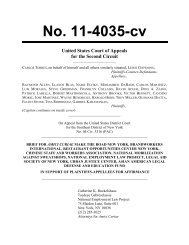National Employment Law Project
National Employment Law Project
National Employment Law Project
Create successful ePaper yourself
Turn your PDF publications into a flip-book with our unique Google optimized e-Paper software.
washes, finding that managers illegally withheld a portion of workers’ tips in 40% of car washes<br />
in New York City and 20% statewide. Steven Greenhouse, Carwashes Violating Wage <strong>Law</strong>s,<br />
State Finds, N.Y. TIMES, Aug. 15, 2008, at<br />
http://www.nytimes.com/2008/08/16/nyregion/16carwash.html.<br />
USDOL itself has found significant violations in industries with large concentrations of tipped<br />
workers.United States Department of Labor, 2003 Statistics Fact Sheet,<br />
http://www.dol.gov/esa/whd/statistics/200318.htm. In 2003, 5048 of USDOL’s 12,962<br />
successful enforcement actions (39%) in targeted low-wage industries involved restaurants. Id.<br />
Given these pervasive violations, USDOL has an interest in promulgating regulations that<br />
provide both strong protections for tipped workers and clear guidance to employers to establish<br />
sound employment practices. Instead, USDOL proposed regulations include misleading<br />
guidance on tips, suggesting that employers may deduct a portion of workers’ tips outside of a<br />
valid tip-pooling arrangement and that they need not provide written notice of their intent to pool<br />
tips. This guidance is confusing and encourages abuse that would adversely impact both tipped<br />
workers and their employers.<br />
(a) Employers Deductions from Workers’ Tips, at Fed. Reg. 43,668<br />
1. USDOL Proposals<br />
One of USDOL’s proposals is to add new regulations that threaten to increase confusion in this<br />
already high-violation industry. Section 531.52 of the proposed regulations provide:<br />
Where an employee is being paid wages no more than the minimum wage, the<br />
employer is prohibited from using an employee’s tips for any reason other than to<br />
make up the difference between the required cash wage paid and the minimum<br />
wage or in furtherance of a valid tip pool.<br />
(emphasis added). While this section does not expressly address situations where employees are<br />
paid more than the minimum wage, the preamble to the proposed regulations describes such a<br />
situation:<br />
If, however, the employer paid the employee a direct wage in excess of the<br />
minimum wage – and thus did not claim a credit against any portion of the<br />
employee’s tips – the employer would be able to make deductions so long as they<br />
did not reduce the direct wage payment below the minimum wage. See Wage and<br />
Hour Opinion Letter WH-536, 1989 WL 610348 (October 26, 1989).<br />
Fed. Reg. 43,659.<br />
2. Comments to the proposed rule<br />
USDOL’s proposed rule fails on two grounds. First, it is confusing. An employer could read the<br />
proposed rule together with the preamble and conclude that it is permissible to “make<br />
deductions” from tips as long as it does not “reduce the direct wage payment below the minimum<br />
8


